
By:
- Judy Piercey
Published Date
By:
- Judy Piercey
Share This:
Nov. 12 Founders Symposium Features TED-style Talks
Campus community invited to hear six faculty members discuss interesting and inspiring work
Innovation. Exploration. Impact. All aptly describe the work of this year’s Founders Symposium speakers. The research and scholarly activities of our award-winning faculty advance the frontiers of knowledge, shape new fields, and disseminate solutions that transform lives. This year’s Symposium speakers exemplify UC San Diego’s impact as a public research university with TED-style talks that share how storytelling and multimedia narratives can amplify community voices; explore the prospects for a world free from hunger; and discuss ethics to guide society’s response to new science and technology. Attendees will also learn about the relational approach to change and learning; what works and what doesn’t in foreign aid; and how interactive documentary theatre can create institutional change.
Professors featured at the Founders Symposium will be Angela Booker, Jennifer Burney, Craig Callender, Alan Daly, Paul Niehaus and Emily Roxworthy. Their talks will follow the two Strategic Plan research themes of Understanding Cultures and Addressing Disparities in Society and Exploring the Basis of Human Knowledge, Learning and Creativity.
The 2015 Founders Symposium will be moderated by UC San Diego alumna Jane Mitchell, an Emmy Award-winning journalist and producer of Channel 4 San Diego’s “One on One with Jane Mitchell.”
The Nov. 12 event includes a reception showcasing student innovation from 4-4:45 p.m. in the Cross-Cultural Center in Price Center East, followed by brief talks about cutting-edge research from 5-7 p.m. in the East Ballroom, Price Center. The Founders Symposium is free and open to the general public. Visit founders.ucsd.edu for event details.
Learn more about the speakers from their responses to four personal questions:
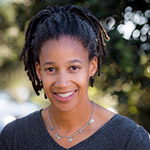
Angela Booker, Assistant Professor, Department of Communication
Storytelling as Means of Promoting the Well-being of Youth and Families in Their Communities
What was the “a-ha” moment that inspired you to pursue the work you do today?
- My family was full of educators (my mom, grandmothers, aunts, uncle, cousins), and my dad was a software engineer. That combination of influences led me to work on a project with families and educators which, in turn, led me to work at one of the first community technology centers in the country. These experiences tuned up my attention to the dynamics of place that influenced interactions. When families and teachers met in community spaces, rather than classrooms, tensions tended to melt away and new collaborative possibilities often emerged. Fascinating!
How does your work matter to the campus and beyond?
- I orient to the university and its role as a public good. So my research grows from community-university partnerships. Each collaboration also supports UC San Diego students to gain supervised field research experiences while learning to surface and challenge assumptions hand-in-hand with local families and community partners. All of us, including our institutions, are asked to learn from one another and to change our patterns.
What still surprises you about your focus area and why?
- I’m surprised by how easy it is to reproduce conditions people are consciously working to transform. I’m also surprised by how well this work aligns with both the university mission and goals of community partners and yet can be so challenging to sustain.
If you could describe the life of a professor in one word, what word would you choose and why?
- “Possibility,” because we get to work at the nexus of curiosity, inquiry and urgency while having access to multiple disciplinary practices and ways of seeing.
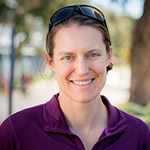
Jennifer Burney, Assistant Professor, School of Global Policy and Strategy
Radically Rethinking Food Security
What was the “a-ha” moment that inspired you to pursue the work you do today?
- Instead of one moment that somehow clearly defined the future for me, I look back instead and see many moments—a conversation with a colleague, a trip, a mentor reaching out—where it’s clear only in retrospect that it was a moment that changed the way I thought, or my trajectory. That said, three realities probably explain how I ended up where I am today: I have always been motivated by inequities, I have a soft spot for all things radiative transfer and I love a challenging measurement problem. In this way, climate and food security was a natural fit.
How does your work matter to the campus and beyond?
- I think it is incumbent upon those of us born into relative privilege on this planet to ask—and at least try to answer—hard questions, both applied and pure, on everyone’s behalf. I hope I can convince some students to put their curiosity to work for humanity, and I hope my own research can help in some small way to put us on a better, more sustainable path.
What still surprises you about your focus area and why?
- It is still shocking to me that many hundreds of millions of people don’t have enough to eat on a daily basis. When you really stop and let that sink in, it’s very uncomfortable.
If you could describe the life of a professor in one word, what word would you choose and why?
- “#BestJobEver.” Seriously—I feel incredibly privileged to explore these kinds of questions and interact with an amazing student body on a daily basis.
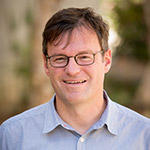
Craig Callender, Professor/Chair, Department of Philosophy
Closing the Gap: Scientific Advances and Ethical Ramifications
What was the “a-ha” moment that inspired you to pursue the work you do today?
- Much of my work is on the philosophy and science of time. Time is one of the last great mysteries. Physics suggests that the way we model time in ordinary life—with a flowing now—is more or less rubbish. Ten years ago the question dawned on me: if physics is right, then why do we all model time the way we do?
How does your work matter to the campus and beyond?
- Einstein said that studying philosophy opened his eyes to the possibility of relativity theory. Philosophers can raise questions about contemporary science that don’t seem to get asked much. We can play a large role in ethical issues raised by innovation in medicine, engineering and environmental science.
What still surprises you about your focus area and why?
- I can’t believe how many open questions remain! In practical ethics, we try to keep pace with innovation, but this is a losing battle. What does “parent” mean in a world with so-called “three-parent” babies? How should identification of various types of brain lesions affect our notions of informed consent and responsibility? Should we genetically engineer mosquitos to prevent malaria?
If you could describe the life of a professor in one word, what word would you choose and why?
- “Fortunate.” Just last week I was teaching relativity theory. I filled up the board with colored chalk spacetime diagrams and equations. Right in the middle, I stepped back, looked at that gorgeous mess, turned to the class and said, “I still can’t believe they pay me to do something this fun.”
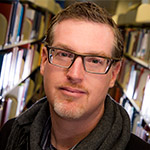
Alan Daly, Professor/Chair, Department of Education Studies
Shifting Terrain: Mapping the Social Space for Learning and Change
What was the “a-ha” moment that inspired you to pursue the work you do today?
- I had no aspirations of going to college until my grandmother connected me with a neighbor who needed yard work done. This man had gone to college and, more importantly, he saw that potential in me. That one network connection changed my life. From that point forward, I knew that relationships could be catalyzers for improving outcomes in a variety of settings and ways often not imagined.
How does your work matter to the campus and beyond?
- An individual’s experience, education and knowledge can be referred to as one’s “human capital.” Human capital has resulted in much improvement in educational systems, but I think we have not focused enough on the potential that resides in our relationships. Value in our social ties is referred to as “social capital” and it is those relationships that hold potential for transforming systems. If we can combine human and social capital we can achieve amazing things.
What still surprises you about your focus area and why?
- I am actually amazed at the idea that in almost every situation in our lives we operate in an interconnected and often interdependent system of relationships. Our words and actions spread through a network of relations in similar ways that the proverbial beating of a butterfly’s wings in India can produce a rain storm in San Diego.
If you could describe the life of a professor in one word, what word would you choose and why?
- I would choose the word “humble.” I am humbled every day by the intellect, openness and commitment of students and colleagues who make me a better professor.
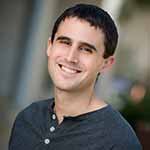
Paul Niehaus, Associate Professor, Department of Economics
Ending Poverty with Electronic Payments
What was the “a-ha” moment that inspired you to pursue the work you do today?
- Realizing with my fellow cofounders of GiveDirectly (a nonprofit that gives money directly to the extreme poor with no strings attached) that (1) cash transfers have arguably the strongest evidence base of any development intervention out there, and (2) advances in last mile payments technology is connecting us financially to the very bottom of the pyramid. Those two things together, I think, have the potential to profoundly reshape the fight against global poverty.
How does your work matter to the campus and beyond?
- I think the fight to end global poverty is one of the two big challenges facing humanity, along with climate. UC San Diego is pretty engaged on both, which is what I think makes it an exciting place to work.
What still surprises you about your focus area and why?
- How much less we know than we think we know, or talk as if we know.
If you could describe the life of a professor in one word, what word would you choose and why?
- “Entrepreneurial.” It’s whatever you make of it.
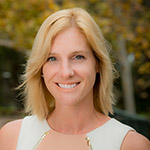
Emily Roxworthy, Associate Professor, Department of Theatre and Dance
How Interactive Theatre Can Create Institutional Change
What was the “a-ha” moment that inspired you to pursue the work you do today?
- It was when I realized that theater was happening everywhere: not just among official “thespians” but in nearly every corner of our society. It made me realize how central theatrical strategies are to our world, even if not everyone goes to “the theater” on a regular basis. We are indeed (to use Johannes Fabian’s term) homo ludens — creatures of play.
How does your work matter to the campus and beyond?
- My work brings theater into the daily workday of our campus and throughout the UC system and beyond, not just as entertainment but as a way to discuss difficult issues and solve intractable problems.
What still surprises you about your focus area and why?
- It always surprises me how powerful audiences can be—they never respond the same way twice and they have so much to contribute to what’s going on onstage. I am also surprised by how theater resonates with almost everyone on an experiential level—whether that be through a very visceral memory of performing in their sixth grade play or through rising to the challenge of performing onstage for the first time, as a mature adult.
If you could describe the life of a professor in one word, what word would you choose and why?
- “Energizing.” We are always so busy doing such a vast range of things and often running all around campus to do them. It’s never the same day twice and we get to interface with so many different types of people, from students to staff to faculty and administration to community members.
Share This:
You May Also Like
Stay in the Know
Keep up with all the latest from UC San Diego. Subscribe to the newsletter today.


